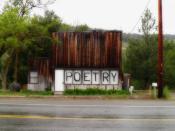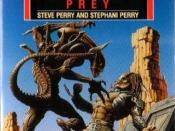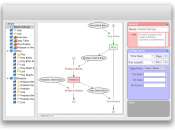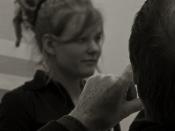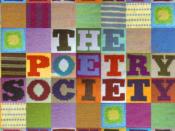Critical Analysis of Jungle Night The speaker of the poem is a civilian observer, probably a local. There is a sense of tension and fear in the speakerâÃÂÃÂs tone. The speaker uses an observatory tone in the poem, a combination between 1st and 3rd person. The author shows us that the speaker is an observer when he says "They are not thereâÃÂæ/You finger the trigger of your Bren." (ll. 8&10) You can clearly see that the author creates tension when he says "Half-fearing, half-desiring the sudden hell/ Pressure will loose." (ll. 11-12) The poet has a way of building us up to a climax then letting us down, and again he gets us on the edge of our seat, only to sit back down quickly.
This poem is written very literally and does not have any deep hidden meanings. The author gives us a sense of predator prey between the "Man with the green cigarette" and the "Man with the dark blue cloak."
We are given a feeling that the cigarette man is hunting and stalking waiting to kill the man with the cloak. The author also uses the image of a "Man with the tiny anvil" who we see as really un-important however we fail to realize that he actual adds a great deal of suspense with the way he taps the metal. In the first stanza he "âÃÂæStrikes it softly like a bell-Tink-tink; tink-tink." (ll. 3-4) and in the second to last stanza "Strikes-twice; Strikes-twice" (l. 21) which gives a sense that something more is yet to come.
In the first stanza when the two men are first introduced, the author uses very soft words, which gives us a sense of peace and serenity. However in the second to last stanza he uses onomatopoeia again saying "Drip-drip; drip-drip"(l. 19) and "Strikes-twice; strikes-twice"(l. 21) which shows us that there is a greater sense of urgency arising and perhaps something is going to happen between these men. Through the use of the language the author is able to give us a sense of what the lone soldier with the Bren is feeling when he sees the two men walk by. The speaker gives us a very human feel when he says, "They are not there/then one of the whistles softly/you finger the trigger of your Bren (ll. 8-10), which allows us to connect with this soldier on a very real and human level.
The structure is very liberal with the stanzas varying in length with no apparent rhyme scheme. There are a few very short abrupt lines, lines 13-15, where we feel a very intense level of suspense, and we expect in the next line to hear of a bloody massacre. However, we are taken back to the stalking feeling, and are left to wonder if something will happen at the next encounter.
This poem is very typical of the poetry of the 20th century utilizing liberal forms with little to no structure. We get a sense that the author is trying to give us a connection to the characters in the poem, which is very typical of modern poetry. A soldier probably wrote this poem because it depicts feelings that only someone who lived through a war could feel and know.
